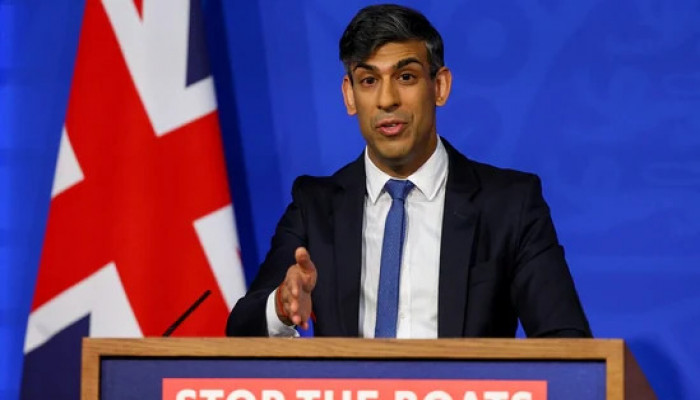UK parliament approves plans to send asylum seekers to Rwanda
- In Reports
- 10:58 AM, Apr 23, 2024
- Myind Staff
On Monday, British Prime Minister Rishi Sunak pledged to begin relocating asylum seekers to Rwanda within 10 to 12 weeks, following the upper house of parliament's long-awaited approval of the necessary legislation. This approval had been delayed for weeks due to efforts to amend the proposed plan.
Sunak stated that the government had arranged commercial charter planes and trained personnel to facilitate the transportation of migrants to Rwanda. Sunak hopes the legislation will boost the dismal fortunes of his Conservative Party in an election widely expected to take place later this year.
The House of Lords had been reluctant to support the contentious legislation without additional safeguards. However, they ultimately acquiesced after Sunak indicated that the government would compel parliament to remain in session late into Monday night, if necessary, to ensure its passage.
"No ifs, no buts. These flights are going to Rwanda," Sunak told a news conference earlier on Monday.
The home secretary, James Cleverly, said it was a “landmark moment in our plan to stop the boats”.
In a video posted to social media, he said, “The safety of Rwanda bill has passed in parliament and it will become law within days.
“The act will prevent people from abusing the law by using false human rights claims to block removals. And it makes clear that the UK parliament is sovereign, giving the government the power to reject interim blocking measures imposed by European courts.
“I promised to do what was necessary to clear the path for the first flight. That’s what we have done. Now we’re working day in and day out to get flights off the ground.”
Tens of thousands of migrants - many fleeing wars and poverty in Africa, the Middle East and Asia - have reached Britain in recent years by crossing the English Channel in small boats on risky journeys organised by people-smuggling gangs.
Stopping the influx of migrants is a key focus for the government, yet critics argue that the strategy to deport individuals to Rwanda instead of processing asylum seekers domestically is inhumane. They raise concerns about Rwanda's human rights record and the potential risk of asylum seekers being returned to countries where they could face danger.
Sunak's new legislation specifies that certain existing UK human rights statutes will not be applicable to the scheme, and mandates that British judges must regard Rwanda as a safe destination, effectively overriding a previous Supreme Court ruling that deemed the scheme unlawful.
It also limits individuals' options for an appeal to only exceptional cases.
Other European countries, including Austria and Germany, are also looking at agreements to process asylum seekers abroad.
On Monday, the legislation was reintroduced to the House of Commons, the elected lower house, where lawmakers discarded amendments proposed by the Lords before the upper chamber reconsidered it.
Certain Labour and unaffiliated peers sought to include provisions in the legislation to safeguard Afghans who had previously assisted British troops, as well as to establish a committee to oversee the safety of asylum seekers in Rwanda. But eventually, the Lords let the legislation pass its final parliamentary step without any formal changes.
The legislation is expected to receive Royal Assent from King Charles later this week and then will become law.
Speaking before the legislation was passed, Sunak said an airfield was on standby, slots were booked for flights and 500 staff were ready to escort migrants "all the way to Rwanda".
Under the policy devised two years ago and endorsed with Rwanda, any asylum seeker who enters Britain illegally will be transferred to Rwanda under a scheme aimed at deterring Channel crossings and dismantling the business model of people smugglers.
Sunak's team is optimistic that this pre-election commitment will help improve his electoral prospects, especially among undecided Conservative voters who are eager to see reduced immigration levels.
He had previously said he hoped the policy would be operational by spring, without giving a precise date.
Polls suggest his Conservative Party will be badly beaten in this year's election by Labour, which has said it will scrap the scheme if it wins power. Labour says it will pursue a deal with the European Union to return some arrivals to mainland Europe.
Despite overcoming parliamentary obstacles, Sunak could encounter legal challenges to the law.
Charities and rights groups have expressed their intention to halt individual deportations, while the trade union representing border force staff pledges to contest the new legislation's legality "within days" of the first asylum seekers being notified of their transfer to Rwanda.
"We urgently need the UK government to start treating refugees with decency and stop trying to send them away to an unsafe future in Rwanda," Lucy Gregg, acting head of Advocacy at Freedom from Torture, said in a statement.
Image source: Reuters







Comments